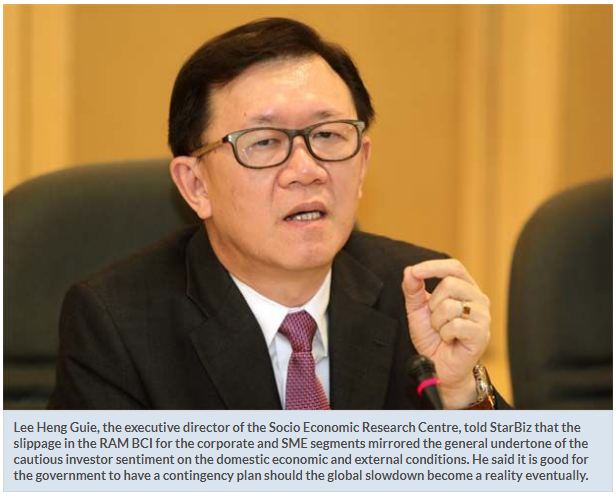Malaysian corporates, SMEs cautious as business confidence weakens
PETALING JAYA: After a weak purchasing managers’ index (PMI) cast a pall over the economy, business confidence expectations for the first half of the year has weakened among corporates and small and medium enterprises (SMEs), according to the RAM Business Confidence Index (RAM BCI).
The poll conducted on 3,500 firms in Malaysia has fallen to its lowest since RAM started publishing the data two years ago and revealed that for the first and second quarters of 2019, the RAM BCI for the corporate and SME segments of business have fallen to 55.1 and 51.0, respectively.
“While an index value of above 50 still denotes positive sentiment, the current downtrend suggests that businesses have a less upbeat outlook on 2019,” RAM said in a statement.
The rating agency said that one of the key factors driving business sentiment in 2019 is the weak economic prospects over the next six months.
“The number of firms citing ‘weak economic conditions’ as their main challenge within this period spiked up to 41% and 41.2% of the overall firms surveyed in their respective segments; this is also the most frequently cited challenge for both segments,” RAM said.
“Decelerating domestic growth, uncertain global demand and investment activities, as well as a lack of positive catalysts, including the relatively neutral Budget 2019, all play a part in the generally weaker business sentiment over the next six months,” it added.
Lee Heng Guie, the executive director of the Socio Economic Research Centre, told StarBiz that the slippage in the RAM BCI for the corporate and SME segments mirrored the general undertone of the cautious investor sentiment on the domestic economic and external conditions.
He said it is good for the government to have a contingency plan should the global slowdown become a reality eventually.
“Malaysia is bound to be affected if there is a synchronised global economic slowdown or global financial meltdown. So, the most important questions are how to overcome them if they happen, and do the authorities have enough tools and policy flexibility to cushion or counteract the global slowdown, if not altogether prevent the fluctuations?” Lee said.
“Faced with fiscal limitations, the government must implement swiftly the budgeted development expenditure for 2019, focusing on those that can yield a short-term multiplier effect. Social safety nets for the targeted vulnerable groups and households must be strengthened to protect them from the impact of economic shocks,” he added.
MIDF Research chief economist Kamaruddin Mohd Nor, meanwhile, told StarBiz that clear policy guidance and priorities have indeed been revealed by the government during the tabling of the mid-term review and Budget 2019.
Kamaruddin said the actual implementation and execution of these initiatives would help boost business confidence.
Despite weak data such as the PMI, which has fallen to its lowest point since 2012, Deputy International Trade and Industry Minister Ong Kian Ming said yesterday that the Malaysian economy was in no danger of slipping into a recession.
Meanwhile, the survey by RAM revealed that the construction sector was the least bullish among both the corporates and SMEs.
RAM said the SME construction sector was the only one with a negative sentiment reading (at 49.7), while the index level for its corporate counterparts declined for the third consecutive time to 53.0.
“Without any new growth catalysts amid the overhang in the property segment, plus the shelving of new big-ticket infrastructure projects, it is not surprising that the construction sub-indices have hit record lows,” it said.
“Another sector that displayed pessimism in the first and second quarters of the 2019 survey was SME retail. This sector’s performance outlook slipped back into negative territory after a brief expansionary momentum that had been aided by the tax-free window from June to August 2018. Faced with uncertain global and domestic economic prospects, consumers are once again more prudent with their spending, leading to weaker sentiment on retail consumption in 2019,” it added.
RAM said that amid weaker prospects, companies were also holding back on capacity building.
It noted that the sub-indices that tracked corporate business expansion, capital investment and hiring have fallen to their lowest levels since the inception of the RAM BCI, after having declined in three consecutive surveys.
“Likewise, the capacity-building sub-indices for SMEs also pulled back from the last survey and remain below those of the corporates,” it said.
RAM noted that firms expressed reservations on capacity building and this remains the most prominent downside risk, as it could weigh on the momentum of economic growth in 2019 and potential economic output over the longer run.
Commenting on this matter, Lee said policy clarity and consistency as well as pragmatism were key to ensuring sustainable investments. “Sustained high-quality and value-added investment growth is much needed to create high-income and skilled jobs for Malaysians. Regulatory and compliance costs must be further streamlined to ease the cost of doing business for SMEs,” he said.
“Businesses want the government to ensure the market works efficiently, enforcing contracts, streamlining and rationalising economic and business regulations, as well as improving administrative efficiency to reduce the transaction costs of doing business,” Lee added.
Kamaruddin said that efficiency in government delivery would help businesses in general.
“The easing of doing business, which emphasises reducing cost and government red tape, would be a welcome move. Clear policy communication is also vital for businesses to plan their business strategy. Thus, in short, the government needs to ensure that its vision is clearly understood by the business community,” Kamaruddin added.
RAM also noted that SMEs were more vulnerable and sensitive to immediate economic challenges.
“That said, more guidance on future economic policies that will shape the overall business environment will be crucial to building business confidence among firms, potentially being the game changer for a more resilient growth trajectory this year,” RAM said.
Source: https://www.thestar.com.my/business/business-news/2019/01/08/corporates-smes-turn-cautious/#YH0UYD4mwGDJsE7w.99


 Thailand
Thailand




